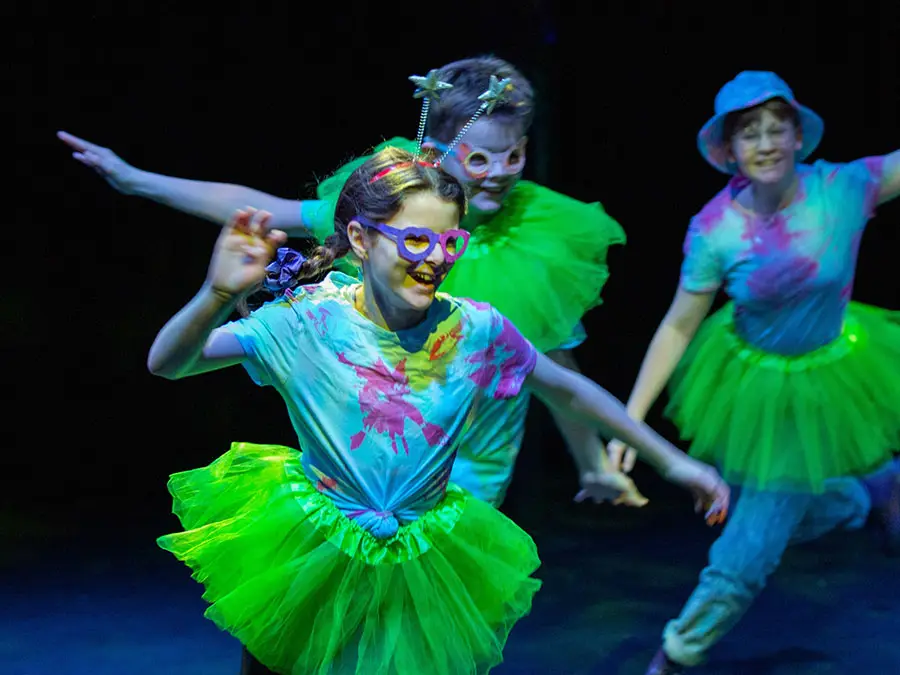Every year Coram Shakespeare Schools Foundation (CSSF) runs the world’s largest youth drama festival, supporting thousands of pupils from every community, background, and school type to perform Shakespeare on theatre stages across the UK. Here, CSSF Head Mike Tucker sets out how as well as strengthening oracy, drama promotes children’s resilience, wellbeing, and emotional intelligence. Despite being largely pushed to the margins in education policy, “we are as clear now as we have ever been that drama is far more than a ‘nice to have’.”

I was struck by the words of our Prime Minister Sir Keir Starmer last month as he announced major investment in youth services geared at helping young people to connect with the world around them: “I don’t know how many businesses say to me, ‘Keir, we can do the technical skills they need for our business, but what we lack with young people is the eye contact, the confidence, the working in a team.’ I think this is hugely important, and that’s why, in the curriculum review, it’s really important we give proper weight to music and creative sectors, whether that’s music, drama, culture, you name it.”
I agree with the Prime Minister. Over the 25 years of the Coram Shakespeare Schools Foundation, we have seen first-hand how developing children’s speaking and listening skills transforms lives. Running the world’s biggest youth drama festival across the UK every year has demonstrated to us just how drama develop children’s oracy, along with a range of other essential skills linked with improved outcomes for children. As well as strengthening oracy, drama promotes resilience, wellbeing, and emotional intelligence. In an era of rising isolation, drama fosters genuine social connection, empathy and collaboration—skills that are essential both in and beyond the classroom.
So we were naturally surprised that the interim report of the imminent curriculum and assessment review, published in March, completely omitted oracy, which had been such a key plank of the incoming government’s discourse on coming into office in 2024.
Drama is set to remain outside the list of foundational subjects in a revised curriculum which will not encourage schools to recruit a drama teacher when cash is tight. And ultimately a student can only choose a subject schools offer.
We are disappointed but not discouraged. Despite being pushed to the margins in education policy and largely sidelined as an enrichment activity for schools by the interim report, we are as clear now as we have ever been that drama is far more than a ‘nice to have’.
In an era of AI and the automation of many careers, with entry level jobs for young people particularly at risk, it is these deeply human skills – empathy, creative thinking, collaboration, and communication – that will be most valuable in helping young people to thrive in a rapidly changing world. The UK’s creative industries contribute £125bn to GDP and employ 2.4 million people, yet many theatres and creative businesses report growing skill shortages. Exposure to theatre — even just once — can change a child’s sense of what’s possible.
In recognising the importance of drama, we must also highlight that access to drama, and the arts in general, is increasingly unequal. We work across both the state and private sectors and see the difference. Private schools continue to invest heavily in the arts while many state schools, under pressure and under-resourced, are often forced to cut back. If schools don’t offer access to drama – and 42% last academic year did not – many pupils miss out entirely. Children from lower-income households are far less likely to experience high-quality creative opportunities in or out of school. Yet it’s precisely those children with fewer opportunities who stand to gain the most from transformative, creative experiences. We are witnessing a growing arts deprivation gap and a visible divide in confidence, communication, and self-belief. The Creative Learning Alliance’s Annual Report Card also illustrates the stark reality: postcode and family income are the most accurate identifiers of access to arts education.
There are positives too. We welcome for instance the indications that creative and expressive arts will be included as a measure of a child’s development as part of Progress 8, which aims to capture the progress pupils make from the end of primary school to the end of Key Stage 4.
And while we await the details of how it will work in practice, we will of course engage with the planned National Centre for Arts and Music Education announced by Bridget Phillipson in March, which will promote opportunities for children and young people to pursue their artistic and creative interests in school.
So our challenge is to join with all those who share our belief in the transformative power of drama to change lives. As we celebrate our 25th anniversary making a difference to young people through performing of Shakespeare, we propose a simple, universal goal: every child should perform in a play before they leave school. It’s low-cost, high-impact, and reaches children who might not otherwise find their voice.
About CSSF
Mike Tucker is Head of the Coram Shakespeare Schools Foundation (CSSF), a cultural education charity that gives young people the confidence and skills to succeed in life.
Every year CSSF runs the world’s largest youth drama festival, supporting thousands of pupils from every community, background and school type to perform Shakespeare on theatre stages across the UK. Months of preparation culminate in exhilarating performance evenings in professional venues nationwide; a night which can give confidence and self-esteem to last a lifetime. The charity’s work is supported by patrons including Dame Judi Dench, Ralph Fiennes, Hugh Dennis and Alfred Enoch.
For more information, please visit https://www.shakespeareschools.org/
